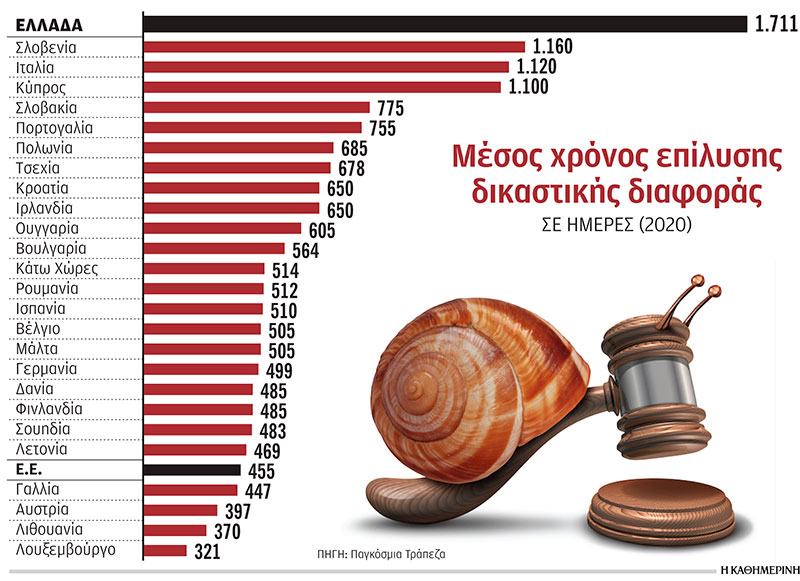Just over…five years will have to wait for the over-indebted household, which in July 2014 received a hearing date of January 19, 2028 to discuss its application for inclusion in the Katseli Law (3869/2010) in the Koropi Magistrate’s Court.
Unprecedented delays in processing debt adjustment applications may be the classic pathogenesis of this law, but they are an integral part of how the Greek justice system works. There are also numerous cases of delays in the administration of justice in other areas. For example, the case of corporate corruption has not yet been considered, although six years have passed since its initiation, and the advanced age of the main defendant, in this case, is an ally of a lengthy trial, reports Katimerini.
While the digitalization of justice is only at an early stage – the maturation of projects in this area is long and laborious – in its recent analysis (“From Justice 0.2 to Justice 2.0”), the Federation of Enterprises and Industry (SEV) notes that in Greece the final it takes more than 4.5 years for businesses to resolve a court case (data for 2020). This is the longest term in the European Union of its 27 member states, more than double even comparisons with Portugal and Slovakia, which have upgraded their systems. These two countries are now approaching the European average. The long wait for a court decision hinders Greek businesses and the investment competitiveness of the economy, according to SEV. The fact that the judiciary is still in the “paper age” limits its ability to handle the required number of cases, making it the 24th fastest civil and commercial court in the world. EU. According to the SEV, delays occurring in trial courts result in three pending cases for every 100 citizens at the end of each year (21st in the EU), given that it often takes 18 to resolve a civil or commercial case. months.
Another factor associated with the delay in the administration of justice is also related to the low use of digital systems by the servants of Themis. According to the Association of Judges and Prosecutors included in the SEV analysis, from 2018 to 2021, digital filings provided for administrative and criminal proceedings accounted for only 7% of the total. This percentage is reduced to 0.2% in the Courts of Appeal of Athens and Thessaloniki, and to 3.4% in the Administrative Courts of Appeal of Athens, Thessaloniki and Piraeus. In addition, the remote presence of lawyers, witnesses and parties is not yet possible, which entails large travel expenses and an increase in time for the implementation of basic judicial and legal acts.
It is significant that the Athens Court of First Instance only got free wireless network in 2018, while WiFi is not working in several district courts.
In order to improve the time spent in the administration of justice, SEV has formulated a grid of 11 proposals, most of which have a common denominator – digitization. They also include mandatory use of digital media, anonymization and openness of judicial data.
Digital projects
To this end, the respective Ministries of Digital Governance and Justice are promoting a number of projects, some of which are already in operation. Using the dikes.moj.gov.gr platform, you can get real-time information about the progress of the consideration of sheets / exhibitions in civil and criminal courts. This service will be provided as part of a project (19.2 million euros) implemented under the Wind-Space Hellas scheme, which aims to provide information on the progress of the examination of sheets and physical evidence in courts, as well as videoconferencing services in courts and prisons.
In addition, the contract for the ICT infrastructure modernization project in the judiciary, which was awarded to the consortium Netcompany Intrasoft – Uni Systems – Q&R – Cosmos Business Systems for 65.3 million euros, is currently being reviewed by the Court of Accounts for a legal review. In the coming weeks, the information society, the executive body of the Ministry of Digital Governance, is expected to tender for the last two projects in the justice sector, which are worth around 200 million euros. These are the modernization of the court records system, the transcription of court records and the introduction of the necessary information system. While significant progress has been made in tendering and, in some cases, digitization projects for the judiciary, the challenge is to complete them on time. That is why SEV offers comprehensive monitoring of their planning and implementation.







More Stories
The most "fragrant" Athens is recognized as the city in the world
Tourism for all: when will the lottery to select beneficiaries be held?
Find out when it starts "godparents basket"what products are included in the list